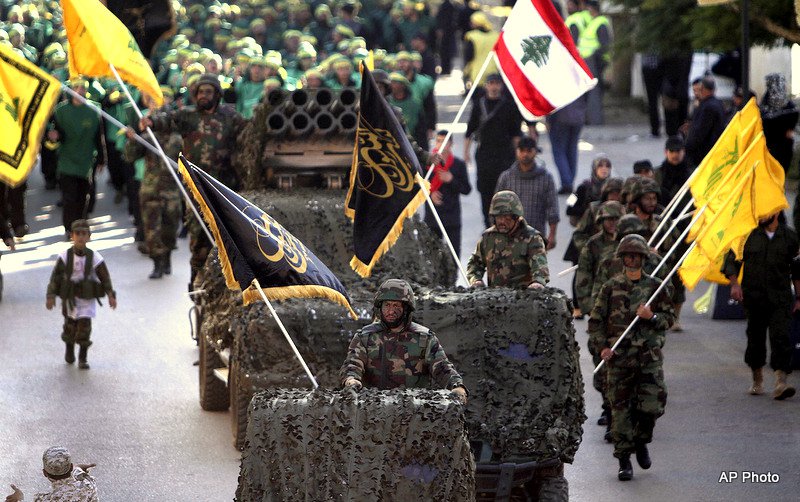The US Quietly Considers Sanctions Against The Biggest Threat To ISIS: Hezbollah
By Sean Nevins/ @seannevins | November 20, 2014
France and Britain are reportedly concerned that a Hezbollah sanctions bill, which unanimously passed the U.S. House of Representatives in July, might crash the Lebanese economy.
Lebanese bank authorities recently told the Daily Star that sanctions would not affect the Lebanese economy, as the group does not even use the country’s banks. One banker said, “I don’t think Hezbollah has an interest in opening an account with any Lebanese bank because they know that this account would be frozen.”
Still, these concerns could be what’s stalling the vote in the U.S. Senate.
“We are in contact with working-level staffers of Congress on a very regular basis to exchange on many foreign policy issues,” a French diplomatic official told Al-Monitor.
“Lebanon is one of the issues discussed, as are Africa, Ukraine, Syria, Iraq or Ebola to name just a few over the last few months,” the source continued.
On July 22, the House of Representatives voted 404-0 to pass the Hezbollah International Financing Prevention Act of 2014 (H.R. 4411), which aims to block Hezbollah’s international financing networks and promote initiatives that stop the organization from engaging in alleged criminal activities.
Hezbollah arose as a political and military force in Lebanon in the 1980s as a direct result of Israel’s 1982 invasion. “Operation Peace for Galilee,” as Israel termed the invasion, led to massive destruction of infrastructure, cities and neighborhoods. It also claimed the lives of tens of thousands of people, including those at the Sabra and Shatila refugee camps, where up to 3,500 people were killed in two days.
The organization is a Shiite Muslim political party and resistance movement that effectively forced Israel to withdraw from Lebanon, and so ended colonial domination, in 2000. The group’s stated goals are to maintain armed struggle and resistance against Israel and the U.S.
The U.S. has sanctioned Hezbollah as a terrorist group since 1995. In 1983, the group killed 258 Americans in a suicide bombing of Marine Corps barracks in Beirut, and was also responsible for the hijacking of TWA flight 847 in 1985.
If passed into law, the H.R. 4411 would put sanctions on Hezbollah’s al-Manar TV and financial institutions that bank with the organization, as well as require the Executive Office of the President to scrutinize the party’s alleged money laundering activities, along with its alleged drug and diamond trades. It also directs the president to designate the organization as a significant foreign narcotics trafficker and a transnational criminal organization. The claims made by the U.S. Drug Enforcement Agency have been contested, however, as a “fishing expedition,” notably by Al Jazeera’s Nour Samaha.
Last year, following the European Union’s decision to designate Hezbollah’s military wing a terrorist organization, the party issued a statement condemning the ruling: “Hezbollah Party considers that the EU’s unjust decision does not in any way echo the interests of the EU people and goes against the principles and values of the Europeans who are supportive of freedom and independence.”
Connection with Iran sanctions
The bill is sponsored in the House by Rep. Mark Meadows, a Republican from North Carolina, who has said he proposed the bill because of the organization’s threat to Israel and the U.S. “We have many faces for Hezbollah but one soul, and that soul is dedicated to eliminating a people [Israelis] off the face of this world,” he stated in July.
Reps. Ed Royce, a Republican from California; Eliot Engel, a Democrat from New York; and Brad Schneider, a Democrat from Illinois, were also instrumental in pushing forward the bill.
These are some of the same representatives who staunchly supported tightening sanctions on Iran even though the Joint Plan of Action in 2013 called for no new sanctions on the country.
Royce and Engel co-wrote a letter to President Obama in June, expressing concern about “potential sanctions relief” for Iran, advising the president to instead intensify sanctions.
In July, Royce stated, “My hope is that the administration will finally engage in robust discussions with Congress about preparing additional sanctions against Iran.”
That same month, Schneider helped introduce the Nuclear Iran Prevention Act, passed by the House, which proposes increasing sanctions on Iran.
Joyce Karam, Washington bureau chief for Al-Hayat, wrote, “H.R. 4411 is almost a replica of the ‘Iran Sanctions Act’ (ISA), passed by Congress in 1996 and renamed in 2006.”
Karam added that the groups advocating for the bill include “the Syrian opposition disappointed with Hezbollah’s involvement in their home country, Lebanese groups allied with March14 who are at odds with Hezbollah and pro-Israel groups, namely The American Israel Public Affairs Committee (AIPAC).”
Sanctions on Iran had three main goals. They were designed to slow down Iran’s nuclear program, empower Western countries at the negotiating table, and use the burden of sanctions to convince Iran to recalculate the benefit of continuing to enrich uranium.
With H.R. 4411, it is unclear whether the U.S. wants to bring Hezbollah to the negotiating table or has a genuine interest in thwarting the efforts and activities of the group, which has attacked Israeli and American interests in the past. Yet it is clear that the bill is being used to indirectly punish Iran.
Sen. Marco Rubio, a Republican from Florida, said in a May statement, “From the Middle East to our own hemisphere, Hezbollah, backed by its state sponsor Iran, threatens the United States, our allies, and our interests.”
“This legislation highlights the diverse illicit activities Hezbollah engages in to finance its operations and ensures that the United States is using all the tools at our disposal to shut down its networks, wherever they exist,” said Rubio, a member of the Senate Foreign Relations Committee.
Indeed, Hezbollah does receive support from Iran and is an integral part of Iran’s power in the Middle East. Thus, H.R. 4411 is a useful tool for neo-conservative lawmakers aiming to derail the Iranian nuclear negotiations. As noted by Al Akhbar, “The problem for the U.S. is not the prospect of a nuclear-armed Iran as such; the problem is a nuclear-armed Iran which actively backs movements that resist Israel.”
The extent of Iran’s support for Hezbollah is not well-known. Estimates regarding its funding are usually based on speculation rather than raw data, according to Amal Saad-Ghorayeb, a Lebanese academic and political analyst, writing for Al Akhbar. Still, she asserts that Iran’s contribution to the group is significant.
“Iranian support for Hezbollah is essentially non-governmental,” wrote Saad-Ghorayeb, but it does come from the highest levels of the state. Ayatollah Ruhollah Khomeini himself directly helps to fund the organization, as detailed by Hezbollah’s representative in Iran, Abdallah Safieddine, and Hassan Nasrallah, the group’s leader. “The party’s direct financial relationship with Khomeini explains why it remains largely unaffected by changes of government in Iran,” Saad-Ghorayeb explains.
Other financial assistance to the group comes from religious leaders called maraji taqlid and a form of tax they receive from their followers. Some of these funds go through Khomeini, while the maraji taqlid and seminaries sometimes directly distribute the money. Charitable foundations in Iran also represent a source of Hezbollah’s funding. These foundations are controlled by religious figures and former and current government officials, Saad-Ghorayeb wrote. Two foundations which are thought to support the Lebanese group are the Foundation for the Oppressed and Disabled and the Shrine of Imam Reza Foundation.


















